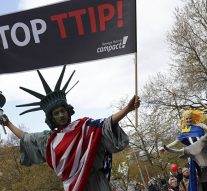
“Houston, we’ve got a Deal” – lights and shadows of the CETA negotiating process
External Relations 10 November 2016What a year for European trade deals! Complicated negotiations and the long-standing opposition coming out from public opinion are two of the main aspects of this last negotiating season: CETA and TTIP are on everyone’s lips, and something really important recently took place, after seven years of negotiations, in Brussels.

Flickr/Campact
“CETA is the best trade agreement the European Commission has ever negotiated,” said President Jean-Claude Juncker speaking to the press after the signature of the landmark trade deal between EU and Canada on Sunday (30 October), adding it will set global standards for other trade agreements.
In general, twentieth-century trade deals mainly focus on cutting tariffs, while most recent ones, between rich countries, tend to regulate other type of obstacles and barriers to free-trade. The need of similar coordination generates worries among European citizens because of the fear to be forced to turn down important achievements in the fields of health and environmental regulation. Inevitably, coordinating standards and common regulations means surrendering a piece of sovereignty. The recent story of the Transatlantic Trade and Investment Partnership (a much bigger deal between EU and US) has shown the existence of intractable obstacles and difficulties during the entire negotiating process. As the “TTIP issue”, many Europeans worry that Comprehensive Economic and Trade Agreement (CETA) will dilute standards and labour laws, while on the other hand, they suspect that the new trial system and the new courts shaped by the treaty in order to settle investor disputes with governments will finally favour big firms and corporations over regulation.
Delayed by Wallonia’s reluctance to approve the deal, the pact was finally signed at a ceremony in Brussels by Canadian Prime minister Justin Trudeau, EU President Donald Tusk, European Commission head Jean-Claude Juncker and Slovak Prime Minister Robert Fico. In particular, negotiations met a “bumpy final landing” with reference to Wallonia’s first approach to the document. On October the 14th the regional parliament of Wallonia (a french-speaking region of Belgium, accounting for about a third of its population and a formerly wealthy industrialised region that is now trying to catch the restructuring of its economy, A/N) voted to block CETA. In this context, Belgium had to face the veto of Wallonia which has been demanding for reassurance and guarantees especially on agriculture, finally gaining concessions that international investors will not be able to force governments to alter. Wallonia concentrated and strongly reported the European farmers’ widespread discontent, being Wallonia a region where can be found a cow for every three humans, and being its farmers abundantly subsidised – so that they are worried about the cheap Canadian competition. The final lifting of the Walloon veto paved the way for the EU-28 bloc to successfully sign the treaty, allowing it to come into force, but only on a temporary basis, starting next year.
Furthermore, CETA must be ratified by 38 regional and national EU parliaments before it officially came into force and to be fully implemented. And Wallonia’s “no-go” vote may have set a not-so-easy precedent.
As we said in a previous article on TTIP, states use economic competition in pursuit of geopolitical objectives. CETA and TTIP can be intended as nothing but a reassurance of the dominance of the industrialized “West”, which still accounts for more than 50 percent of the global economic output and one third of all global trade. Furthermore we underlined how, within the framework of the WTO, developed countries and their competitiveness have experienced the increasing pressure in negotiations exerted by the fast growing economies of the large emerging countries: China, India, Turkey, Brazil and Russia.
After years of crises, low growth and political tension in the West, China and the other emerging economies exert their political influence via economic and financial success. In this regard, the development of a western-trade-bloc would strengthen the Western economic model against the growing influence of the Rest of the World. Size matters, especially in the geopolitics of trade.
In numbers, CETA will make Europe €5.8 billion reacher per year, removing 99% of existing tariffs and potentially boosting bilateral trade by 20%, linking the EU single market with the world’s 10th largest economy (nominal GDP, A/N) and member of the G7 club.






